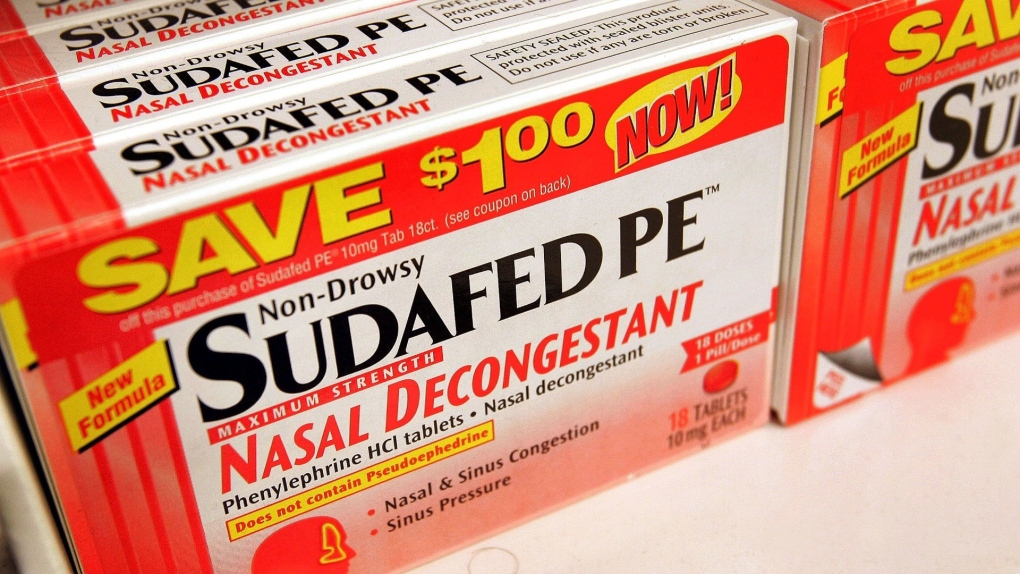Phenylephrine, a popular ingredient in many over-the-counter allergy and cold medicines, is ineffective in tablet form, an independent advisory committee to the U.S. Food and Drug Administration agreed Tuesday.
Phenylephrine is the main ingredient used in products like Benadryl Allergy Plus Congestion, Sudafed PE and Vicks Sinex.
The ingredient is considered safe to use; that was not up for debate. But many doctors have questioned phenylephrine’s effectiveness for years. These products generated nearly $1.8 billion in sales last year alone, according to data from the FDA that was presented to the Nonprescription Drugs Advisory Committee on Monday during the committee’s two-day meeting.
On Tuesday, the committee voted no on the specific question: “Do the current scientific data that were presented support that the monograph dosage of orally administered phenylephrine is effective as a nasal decongestant.”
The vote was unanimous among its 16 members, and the committee agreed that the issue doesn’t need to be studied any further.
“We really should not have products on the market that are not effective,” said committee member Dr. Diane Ginsburg of the University of Texas at Austin College of Pharmacy.
The FDA told the committee it would take its advice into consideration, although it did not give a timeline. If the agency decides to reclassify phenylephrine from Generally Recognized as Safe and Effective (GRASE), stakeholders would have the opportunity to comment on the proposed change and to provide any additional data. During that process, companies would still be allowed to market products with phenylephrine. But if the FDA agrees with the committee, companies may be required to remove products with phenylephrine from store shelves or reformulate them.
The agency approved phenylephrine for over-the-counter use in the 1970s, but it became even more common after 2005, when legislation restricted access to OTC drugs that use a similar decongestant ingredient called pseudoephedrine.
In 2007, the FDA committee looked at the science available at that time and came to a different conclusion, agreeing that the phenylephrine “may be effective,” but it also called for more research.
Studies since then, including three large clinical trials, showed that the orally administered ingredient is not effective as a decongestant in its typical dosage.
The committee also looked at other research used to support its use over-the-counter. The FDA found that those study results were inconsistent and many did not meet modern scientific standards.
The committee did not take up the issue of nasal spray products that use phenylephrine, which studies seem to show are effective, at least temporarily.
Phenylephrine is considered the most common ingredient in over-the-counter oral nasal and sinus products, according to the American Academy of Allergy, Asthma and Immunology. Last year, the group supported a citizens petition to remove the drug’s over-the-counter status.
Phenylephrine works by temporarily reducing the swelling of blood vessels in the nasal passages. A respiratory infection or allergies prompt the body to send white blood cells to the nose, throat and sinuses, leading to swelling in the nasal membranes and the creation of mucus. Decongestants constrict the blood vessels in the sinuses and nose, reducing the swelling and helping fluids drain.
In pill form, some scientists say, phenylephrine gets absorbed by the gut and is metabolized so well that only a tiny bit makes it to the bloodstream, where it is needed to reach the nose, according to the citizen petition that asks the FDA to pull the drug from store shelves. A citizen petition is a way for industry, consumer groups or individuals to petition the FDA to change regulations or take other administrative action.
In discussing Tuesday’s vote, the committee agreed that safety wasn’t why they wanted the FDA to take action on these products. Rather, they were advising the FDA to act because the tablets were essentially a waste of money, and over-the-counter medications can help people who have colds or allergies.
“It’s amazing the amount of dollars being spent on something that has really no efficacy,” said committee member Dr. William Fig, a clinical pharmacologist and investigator at the National Cancer Institute.
Every year, many Americans seek relief with over-the-counter cold and allergy medicine. About 60 million people in the United States have allergies, and adults get two to four colds per year, according to the American Lung Association, for a total of 1 billion colds a year.
Colds and allergies can have a significant effect on quality of life, studies show. In addition to a runny nose and coughs, allergies and colds can aggravate asthma and cause trouble sleeping.
A change to phenylephrine’s designation could be costly to manufacturers. The Consumer Healthcare Products Association, which represents makers of over-the-counter medicines and dietary supplements as well as consumer medical devices, opposes a change.
The association said Tuesday that it was disappointed in the committee’s decision and encouraged the FDA, before it makes any regulatory changes, to “be mindful of the totality of the evidence supporting this long-standing OTC ingredient, as well as the significantly negative unintended consequences associated with any potential change in oral PE’s regulatory status.”
It told the FDA committee that its surveys show that people prefer their decongestants in tablet form over nasal spray. If these drugs were not available anymore, it could be a real burden to consumers, the association said.
On Tuesday, the FDA committee said that if the FDA decides to reclassify phenylephrine and it goes off the market, the agency will need to educate the public about why some of popular allergy and cold drugs were no longer available.
If phenylephrine is no longer available, there are several other OTC options including nasal spray antihistamines, nasal corticosteroids and nasal saline products, as well as tablets with pseudoephedrine.
Products with pseudoephedrine are considered OTC but are kept behind the counter because in large quantities, pseudoephedrine can be used to make the illegal drug methamphetamine.
CNN’s Meg Tirrell contributed to this report.

